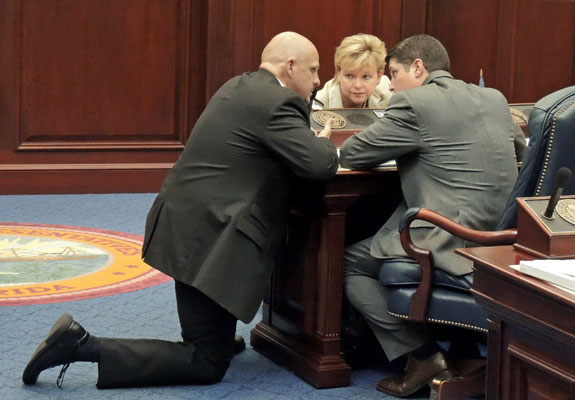
Rep. Ritch Workman, R-Melbourne, Rep. Janet H. Adkins, R-San Fernandina Beach, and Speaker-designate Steve Crisafulli, R-Merritt Island, talked on the House floor on March 12. (Photo by Mark Foley.)
By Ashley Lopez
Florida Center for Investigative Reporting
During this legislative session, state lawmakers have been working to pass a bill that would end some of the unethical behavior propagated by the state’s lax campaign finance rules.
A House bill attempts to addresses abuses in state-level political action committees used by leadership in the Florida Legislature. These committees, called committees of continuous existence, or CCEs, allow candidates to raise unlimited amounts of money from businesses in the state. Lawmakers with CCE funds write checks to other candidates in their party, which in turn help them secure leadership positions, and also use CCE money to pay for personal entertainment, travel and meals.
The House bill establishes additional rules for CCEs — but also raises the contribution limit to individual candidates from $500 to $5,000. The logic behind this change: If the individual contribution limit is higher for candidates, those candidates wouldn’t need CCEs.
But campaign finance experts say raising the campaign contribution cap would just take the state backward. As a result, the more-moderate Florida Senate this week decided to make some changes to the House bill.
According to the Miami Herald:
The Senate Rules Committee passed its version of the House priority, a rewrite of the state’s campaign finance laws, but only after stripping out a provision that would have raised the campaign finance limits from $500 per election to a tiered system up to $3000 per election for statewide candidates.
The committee was the last stop for SB 1382 and the amendments added to the bill by its sponsor, Sen. Jack Latvala, R-St. Petersburg, and Sen. Andy Gardiner, R-Orlando, were clearly intended to influence the Senate’s bargaining position with the House. The position also bows to Gov. Rick Scott, who repeated his opposition to raising the cap on campaign contributions in Miami on Tuesday.
“No one’s explained to me why they want to do it. That’s the first thing,” Scott told reporters. “I want to keep as many people involved in campaigns as possible….No one’s giving me a rationale.”
Campaign finance experts also have said that implementing rules requiring the state Republican and Democratic parties to disclose details of how they spend millions of dollars in contributions would be a better policy move. In Florida, political parties can raise unlimited amounts of money from large donors and corporations, but they don’t have to earmark the cash for either the House or Senate. That makes following the money difficult.
The Senate bill also reverses efforts in the House bill to levy additional reporting dues on unions, which are at odds with the GOP-controlled Florida Legislature.
According to the Herald:
Under current law, unions and members of associations that collect dues from their members to contribute to their political committees in small but frequent amounts are exempt from the state reporting requirements. The House bill repeals that provision and Latvala believes it is a targeted attempt to increase the paperwork and costs for unions and goes too far.
“Behind all the rhetoric, one of the goals of the House in changing from CCEs is to abandon the ability for them to do that,’’ he said. “There are 600 CCEs and 300 of them are membership organizations.’’
The Senate bill allows members of dues-paying organizations to continue to may payments to political committees but rather than being completely exempt from the reporting requirement, must report at least once a year.
The House and Senate bills are on their way to final votes, but if passed, they would need to be reconciled in a conference committee.
